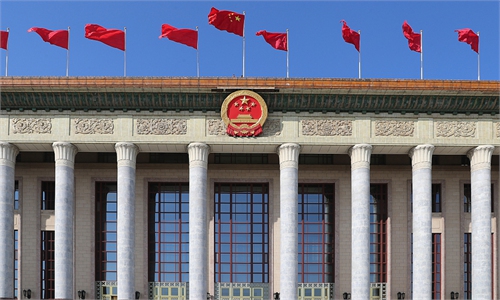Opinion: 'Investor flee' hype will fall down as yuan-denominated assets remain attractive

File Photo: VCG
Since the Russia-Ukraine conflict, Western naysayers who never miss a chance to discredit China's economy, have intensified the "investor flee" hype saying "capital outflows from China's stocks, bonds and mutual funds accelerated," as Bloomberg claimed in a report on Monday.
Such "capital flight" hype to slander Chinese assets has long existed. It exaggerates the normal flow of capital across borders and also aggressively attacks China's policies, from Beijing's legitimate regulatory measures on the technology sector to its effective anti-epidemic efforts.
After the US and Chinese bond yields converged last week, some Western media outlets said that foreign investors, who have been pouring money into Chinese bonds for years, have lately been retreating due to a host of reasons that include rising geopolitical risks and shrinking returns. Such reports create the false impression that the preference of global investors for Chinese assets has been reversed. However, that is not the case.
In fact, the yuan's exchange rate still remains stable and the pressure of capital outflow is far less than the pessimists claim. The current fluctuation of cross-border capital under securities investment is still within a normal and controllable range. China's economy beat growth expectations reaching 4.8 percent in the first quarter. The good fundamentals determine that yuan-denominated assets are still attractive in the context of high global inflation.
It is normal that nominal US Treasury yields are higher than in China, as the monetary policies of the two countries have diverged. Analysts noted that while nominal US Treasury yields are expected to top their Chinese counterparts more frequently in the foreseeable future, in real-world terms, Chinese yields remain competitive, meaning the impact on foreign capital outflows is limited.
As a large proportion of economies across the world are facing high inflation pressure caused by the US' money-printing policy. The Russia-Ukraine conflict has become the latest wild card for investors who are already concerned with global supply chain disruptions, the 7.5 percent inflation rate in the US and its spillover effects on the world. The potential tightening policy from the US Fed to cope with the inflation is expected to bring risks to international financial markets.
China's strong economic foundations provide strong support for yuan-denominated assets. It is anticipated that the yuan will remain to be a "safe haven" currency and most likely will win a larger market share in international settlements. Even the report by Bloomberg recognized that some international investors noted divesting from China may not be a straightforward choice. The world's second-largest economy has a $21 trillion bond market and equity bourses valued at $16.4 trillion in the mainland and Hong Kong while some investors still see Chinese assets as a haven.
Data from the Ministry of Commerce published last week also corroborate the views of these investors with FDI flows into China rising by 25.6 percent to 379.87 billion yuan ($59.66 billion) year-on-year during Q1 this year.
China's complete industrial supply chains and investment-friendly environment make it a terrific destination for foreign direct investment. Overseas investors are seeking returns and shun the alleged risks of investing in China. As the country continues to roll out support policies to boost its economy and opening-up, the naysayers' "investor flee" hype will collapse on itself.
The author is an editor with the Global Times. bizopinion@globaltimes.com.cn



